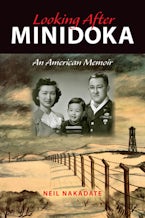- Home
- Looking After Minidoka
Preparing your PDF for download...
There was a problem with your download, please contact the server administrator.
Looking After Minidoka
An American Memoir
Published by: Indiana University Press
236 Pages, 19 b&w illus.
- eBook
- 9780253011114
- Published: October 2013
$9.99
Other Retailers:
During World War II, 110,000 Japanese Americans were removed from their homes and incarcerated by the US government. In Looking After Minidoka the "internment camp" years become a prism for understanding three generations of Japanese American life, from immigration to the end of the twentieth century. Nakadate blends history, poetry, rescued memory, and family stories in an American narrative of hope and disappointment, language and education, employment and social standing, prejudice and pain, communal values and personal dreams.
Preface: My Nickel
Acknowledgements
Note on Terminology and Pronunciation
Introduction: Looking After Minidoka
I. Issei
II. Nisei
III. Minidoka, 1942-1945
IV. Sansei
V. Unfinished
Bibliography
Credits
Neil Nakadate is Emeritus Professor of English, Iowa State University.
"This remarkable book is highly recommended reading for (younger) Sansei, Yonsei, Gosei and members of the burgeoning hapa population, as well of those of whatever background, in and out of educational institutions, who seek enrichment as individuals and communal beings within a multicultural nation via greater awareness of the Nikkei experience in the United States."
~Nichi Bei
"Poetic yet sharply honest, the family story unfolds within the larger context of the national saga. You'll wince but read it anyway. Your soul will be better for it."
~Nuvo
"This book is highly readable and contains fascinating details not usually covered in other books on Japanese American history. "
~Oregon Historical Quarterly
"This is a compelling story, one that deserves being far better known than it is. . . . This book is very well written. It is clear, well organized, and rises here and there to a quiet grandeur. . . . It is much more than a labor of love, for his love is backed by solid industry and intellectual craft."
~David Hamilton, author of Deep River: A Memoir of a Missouri Farm
"Looking After Minidoka is an innovative and engaging excursion into buried history—global and personal. A compelling family narrative, peppered with fragments of memory, history, and poetry, this heartfelt memoir underscores the power of the American Dream, as well as how easily fear and intolerance can corrupt it."
~Dean Bakopoulos, author of My American Unhappiness
"By his skillful blending of history and memoir, Nakadate lifts the veil on a story too often shrouded in shadow, revealing beneath a portrait of a Japanese-American family in search of the differences between home and homeland."
~BJ Hollars, author of Sightings: Stories
"Neil Nakadate's clear-eyed, carefully researched but nonetheless passionate book is rich with the closely observed details of internment camp life. Looking After Minidoka, written with wisdom, understanding, and a writer's eye for the stories worth telling, is not only an important contribution to the literature of internment but also a important story about the promise and peril of America."
~Lauren Kessler, author of Stubborn Twig: Three Generations in the Life of a Japanese American Family
"Neil Nakadate's Looking after Minidoka: An American Memoir is a beautifully crafted, powerfully moving American narrative. . . Nakadate's memoir gives poignant life to chapters of American history that are still being written today by all who dream to be, as Nakadate's mother's transcribed name of "Meriko" says it, "a child of America.""
~Ramón Saldívar, editor of The Imaginary and Its Worlds: American Studies after the Transnational Turn
"The story of our country is the story of a family is the story of a man, Neil Nakadate, whose richly researched and deeply felt memoir will move your head and your heart."
~Benjamin Percy, author of Red Moon
Connect with Break Away Books on Facebook and Twitter Read an IU Press blog interview with the author

